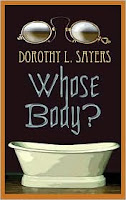Lord Peter Wimsey is an aristocrat who loves to dabble in amateur detective work for fun. He enjoys his shallow aristocratic comforts, but these vanities disguise a deep intellect, keen powers of observation, and kind heart. His good humor and quick wit are delightful and even the most gruesome tales are full of a lighthearted sense of humor underscoring the macabre. Unlike other mysteries of the time featuring amateur detectives, Wimsey is mostly respected by Scotland Yard and is best friends with Chief Inspector Charles Parker.
 Whose Body? is Sayers' first Lord Peter Wimsey novel, and details his first attempt at solving a murder mystery. When an unidentified man is found dead in someone else's bathtub, wearing nothing except a pair of expensive pince-nez, questions immediately arise about whether this could be Sir Reuben Levy -- a successful financier who disappeared the night before. Based on the evidence, Lord Peter immediately disregards the police's theory, but he is intrigued enough to investigate both the murder and the disappearance. Much of the novel focuses on unfolding the mystery, of course. But there is a lot of attention paid to developing Wimsey's singular personality, which makes it far more enjoyable than other mysteries of the same era.
Whose Body? is Sayers' first Lord Peter Wimsey novel, and details his first attempt at solving a murder mystery. When an unidentified man is found dead in someone else's bathtub, wearing nothing except a pair of expensive pince-nez, questions immediately arise about whether this could be Sir Reuben Levy -- a successful financier who disappeared the night before. Based on the evidence, Lord Peter immediately disregards the police's theory, but he is intrigued enough to investigate both the murder and the disappearance. Much of the novel focuses on unfolding the mystery, of course. But there is a lot of attention paid to developing Wimsey's singular personality, which makes it far more enjoyable than other mysteries of the same era.My library has only a few of Sayers' novels, so I next picked up a collection of short stories featuring Lord Peter Wimsey, The Complete Stories. These were even more delightful and gave me a better appreciation for Sayers as a mystery writer. Her plots are very imaginative and varied, with unusual points of conflict -- such as a dead uncle who bequeaths his digestive system to a favorite nephew -- that are often more interesting than the murder mysteries. Have you ever heard of mirror-image twins? I hadn't before reading one these stories, and that's just one of many interesting twists. Another plus; the style of dialogue and narrative voice clearly belong to that era, but her humor and intellect can be equally appreciated by today's audience.
I just finished The Nine Tailors, reputed to be her best Wimsey novel according to one reviewer. Of the three books, I definitely saved the best for last. In this mystery, Lord Peter is temporarily stranded in a remote village over New Year's Eve and is invited to stand in as a change-ringer for an ambitious peal the Rector has organized to ring in the New Year. Having thus become linked to the Rector and the village, he is called back later in the spring to investigate an unidentified corpse that is unearthed in the churchyard. The further he investigates, the more the corpse appears to be tied to a baffling theft in the village's history that led to the financial ruin of a noble house. Sayers throws in some twists and surprises, including an "Aha!" ending that leaves the reader marveling at its genius simplicity. One of the things I really enjoyed about it is that instead of withholding crucial evidence from the reader, she presents it all so that you could theoretically figure it out yourself (even if you're like me and don't). It was a smart and engaging story, and I'm wondering why it's taken me so long to discover these wonderful novels!


Dorothy Sayers helped develop the Classical method of education through an influential essay she wrote, The Lost Tools of Learning. I'm using it as a framework for my homeschooling this year. She was a fascinating person. I'll have to try her fiction out.
ReplyDeleteI LOVE these books! I'm in the process of reading the 4th or 5th one now. How did Ms. Sayers make something written in the 1920's sound so contemporary. Delightful books, but not for lazy readers. Good review. I am not biased. :)
ReplyDelete